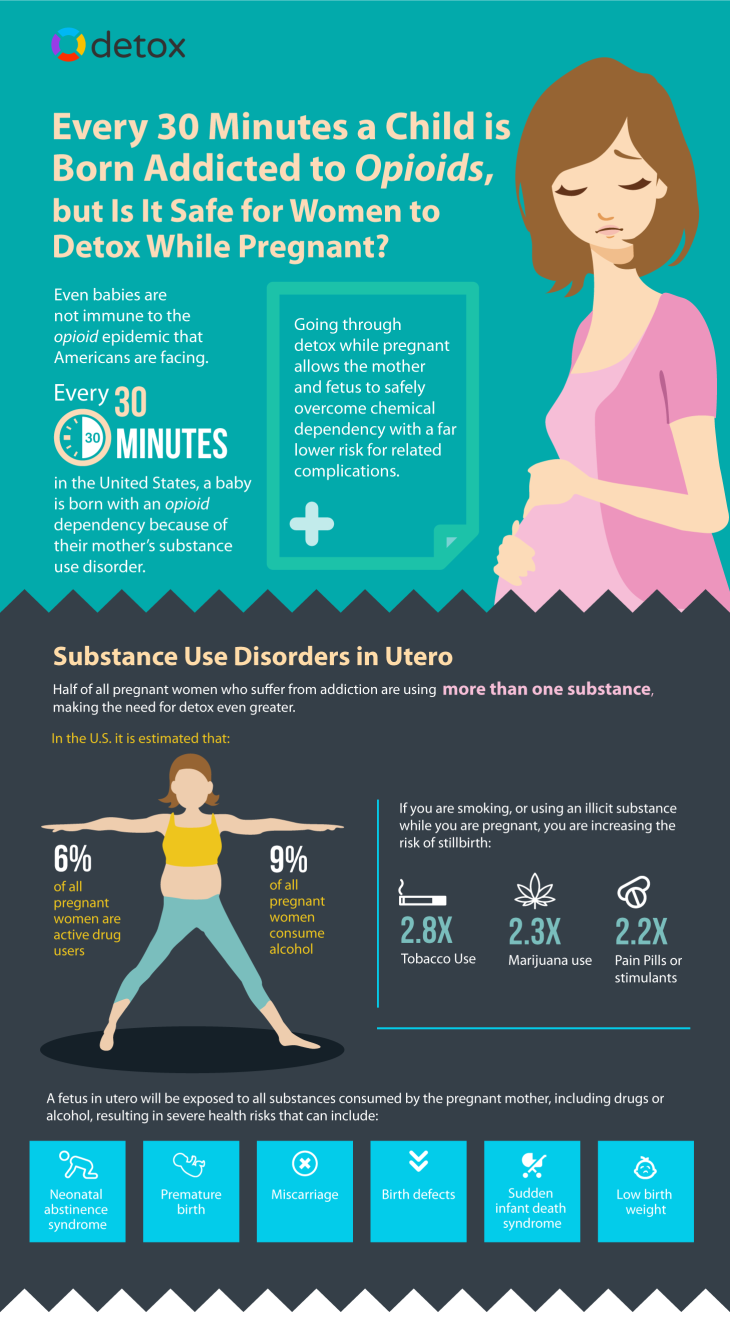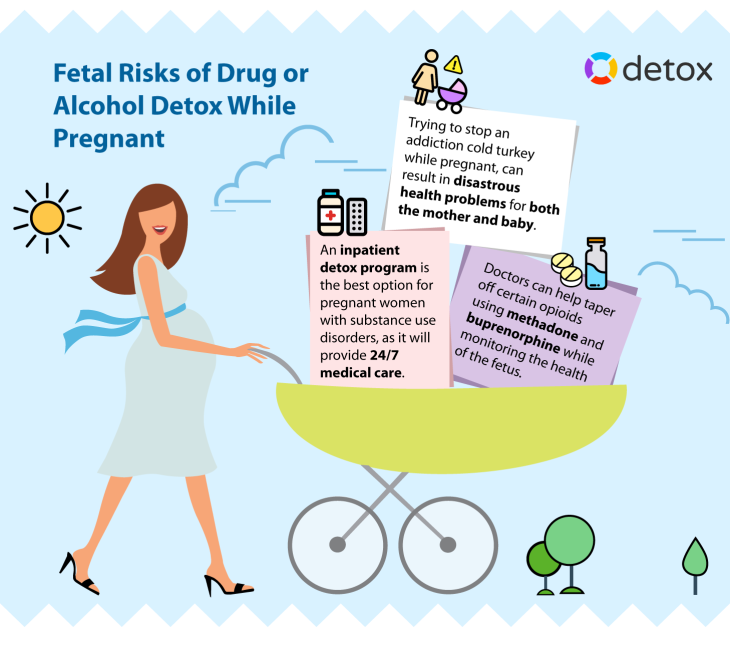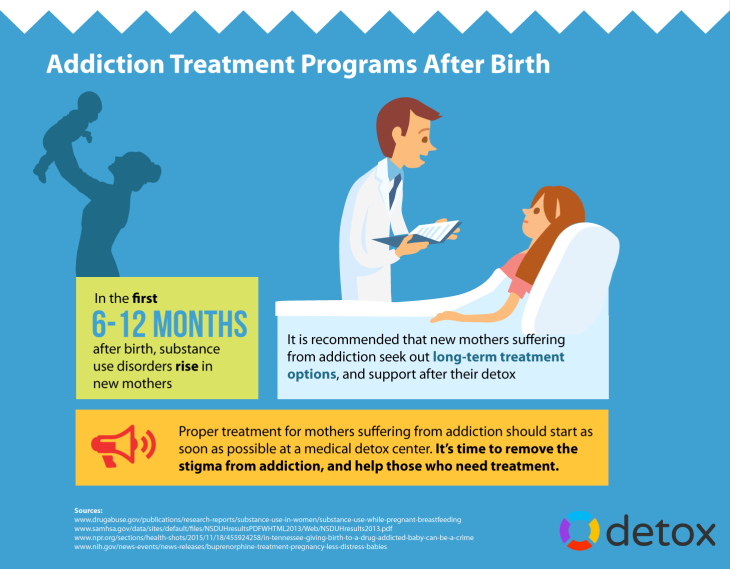Discover if it is Safe For You to Detox While Pregnant
When you’re pregnant and suffering from addiction, it can be difficult to determine what you should do next to protect you and your baby. While quitting drugs and alcohol abruptly may seem like the fastest, most effective way to overcome addiction, quitting cold turkey comes with a great number of health risks for you and baby, including miscarriage and premature labor. At the same time, continuing drug and alcohol use while pregnant offers the same serious health risks, along with stillbirth and maternal death.
If it’s dangerous for you to quit drugs and alcohol cold turkey while pregnant, but just as dangerous to continue using, what’s the safest way to overcome addiction without putting you and your unborn baby at risk?
Drug and alcohol detox centers offer pregnant women safe, comprehensive treatments that can help them overcome addiction without risking their lives, or those of their unborn children. In fact, pregnant women who struggle with addiction are considered a priority for many treatment centers, and may even qualify for free or low-cost detox so they can get started on saving the lives of their babies as quickly as possible.
Here’s what you need to know about the dangers surrounding substance abuse and pregnancy, in addition to options for pregnant women when it comes to detox treatment.

Pregnancy and Substance Use Disorder in the U.S.
Of all the pregnant women in the United States, nearly six percent use illicit drugs and nine percent use alcohol. This means that over 380,000 babies are exposed to illicit drugs, and over 550,000 babies are exposed to alcohol while in the womb. Research also shows that women in their reproductive years between the ages of 18 and 44 are at highest risk for suffering from substance use disorder. Plus, roughly 50 percent of all pregnant women who suffer from addiction are using more than one substance.
Aside from nicotine, the three most commonly abused substances among pregnant women in the U.S. are alcohol, marijuana, and cocaine, according to 2012 data. But opioid use during pregnancy has also been on the rise in recent years due to the country’s opioid crisis.
From 2000 to 2009, opioid use during pregnancy increased five-fold in the U.S. From 2000 to 2012, the number of babies born with NAS also increased five-fold.
According to the National Institute on Drug Abuse, one baby is born with NAS every 30 minutes in the U.S.
Heroin and painkiller use during pregnancy can cause unborn babies to become physically dependent on opioids and suffer neonatal abstinence syndrome, or NAS at birth. Babies born with NAS suffer opioid withdrawal symptoms similar to those experienced by adults who quit using heroin and opioids, but are often at greater risk for lifelong complications and death.
Common symptoms of NAS include diarrhea, irritability, and more serious symptoms including seizures and slow weight gain. Babies born with NAS are often closely monitored in neonatal intensive care units to reduce the risk for complications as they go through opioid withdrawal.
Dangers of Drug and Alcohol Use During Pregnancy
Any foods or substances a woman consumes during pregnancy will pass through the placenta to her baby. This is why pregnant women are generally advised to steer clear of substances such as caffeine, high-mercury fish, and raw eggs — all of which can increase the risk for birth defects. Alcohol, illicit drugs, and some prescription drugs are also highly toxic for unborn babies, and can lead to birth defects and complications.
Pregnant women who use marijuana are at 2.3 times greater risk for stillbirth than women who do not use marijuana. Pregnant women found to be using stimulants, opioids, and/or marijuana are at 2.2 times greater risk for stillbirth, while those who smoke cigarettes are up to 2.8 times greater risk for stillbirth.
Using drugs and alcohol during pregnancy not only increases the risk for birth defects and other health problems, but can lead to lifelong physical and psychological conditions that affect one’s overall quality of life. For instance, women who consume alcohol during pregnancy can give birth to babies with fetal alcohol spectrum disorders, or FASDs — a group of conditions marked by learning disabilities, speech delays, vision problems, and more. FASDs affect roughly 1.5 babies in every 1,000 live births across the U.S.
Health complications associated with substance abuse during pregnancy:
- Miscarriage
- Placental abruption
- Premature labor and birth
- Low baby birth weight
- Jaundice
- Small head size
- Abnormal facial features
- Poor memory
- Problems with learning and concentration
- Speech and language delays
- Vision and hearing problems
- Behavioral dysfunction
- Heart defects
- Infections, such as AIDS and hepatitis C
- Sudden infant death syndrome, or SIDS
Contact Detox.com now to find drug and alcohol detox centers near you!
Babies born with NAS can display symptoms within as early as three days after birth, or as late as two weeks following birth. NAS symptoms can last for up to six months, depending on the baby’s opioid dependency level and health status.
Common symptoms of NAS:
- Diarrhea
- Vomiting
- Poor feeding
- Abnormal sucking reflex
- Slow weight gain
- Shaking
- Sweating
- Stuffy nose
- Sneezing
- Excessive yawning
- Irritability
- Rapid breathing
- Rapid heart rate
- Fever
- Excessive, high-pitched crying
- Blotchy skin
- Sleep problems
- Seizures
If you or a pregnant loved one is using prescription opioids for pain treatment, contact your healthcare provider immediately to notify them of your pregnancy. Your doctor can confirm whether the drugs you’re taking are considered safe for pregnancy, and may prescribe other effective medications that are safer for pregnant women and their unborn babies. This helps prevent you or your loved one from unintentionally exposing the fetus to substances that increase the risk for NAS.
Why Detoxing During Pregnancy is Safer Than Quitting Cold Turkey

When people who are physically dependent on drugs and alcohol quit using those substances abruptly, their bodies go through withdrawal in an attempt to rebalance themselves. Some withdrawal symptoms can be severe and life-threatening for both mother and baby — especially for those who have been using large amounts of drugs and alcohol for an extended period of time.
Here are risks associated with quitting each of these substances cold turkey:
Alcohol
Quitting alcohol cold turkey can lead to a condition called delirium tremens or DT, which causes sudden and severe changes to the brain and central nervous system. DT can cause seizures, irregular heartbeat, and problems with eye movement, and can lead to death in both mother and baby.
Opioids
Respiratory depression is one of the more serious withdrawal symptoms associated with quitting heroin and opioids cold turkey, and can prevent unborn babies from getting the amount of oxygen they need. Opioid withdrawal can also cause anxiety and depression, which may be worsened on behalf of increased hormone production during pregnancy.
Opioid abuse is a major epidemic in the U.S. Get the help you need today!
Stimulants
Withdrawing from stimulants triggers a higher number of psychological symptoms than physical symptoms, and can lead to anxiety, depression, and suicidal ideation. Quitting cocaine and prescription stimulants like Ritalin and Adderall abruptly during pregnancy can worsen symptoms on behalf of increased hormone production.
Benzodiazepines
Quitting these central nervous system depressants abruptly can cause an increase in heart rate, blood pressure, and body temperature — all of which can put mother and baby at risk for birth complications and death.
Going through detox while pregnant allows you and your fetus to safely overcome chemical dependency with a far lower risk for related complications. Many detox centers will monitor pregnant women throughout withdrawal, and may use treatments that allow women to withdraw from drugs and alcohol gradually, instead of cold turkey.
How Does Detox Work for Pregnant Women?
Drug and alcohol detox centers will develop personalized treatment plans for each pregnant woman based on the level of abuse and her current state of health. Detox treatments may vary greatly from one another based on the substances the mother is being treated for. Some detox methods involve 24/7 medical care so women and their unborn babies can be monitored closely during withdrawal.
Detox treatments for heroin, opioids, and most prescription drugs are often conducted using a tapering method. Tapering is when a patient’s dosage is gradually reduced over time until they are no longer physically dependent on the drugs. This detox method helps reduce and eliminate withdrawal symptoms — allowing patients to recover more comfortably without the effects of quitting cold turkey. Sometimes these drugs are replaced with other prescription drugs that carry a far lower risk for addiction, and are safe for both mother and baby.
Alcohol and benzodiazepine detox treatments often require around-the-clock monitoring, since pregnant women are at heightened risk for complications such as seizures and death. Many times, prescription medications are used to minimize and treat specific withdrawal symptoms, for only for a short time to reduce health risks. Medical supervision is one of the most critical aspects of alcohol detox for pregnant women — especially since pregnant women metabolize medications more quickly than non-pregnant women, and may suffer more severe symptoms.
Detox treatments for pregnant women may last as little as one week, or as long as several months. Many women choose to receive ongoing addiction treatment after they have given birth to learn the skills needed to stay healthy and take care of their children as sober individuals. If you or a loved one is pregnant and needs drug or alcohol detox treatment, one of our experienced substance use disorder counselors can discuss your treatment options and the possible length of treatment.
Toll-free
800-671-4304
Call Now
Going Through Opiate Detox While Pregnant
Heroin and opioid addiction are commonly treated using FDA-approved medications methadone and buprenorphine. These medications work by mirroring the effects of opioids without producing euphoria — allowing patients to avoid drug cravings and other unpleasant withdrawal symptoms while in recovery. Methadone and buprenorphine can be safely used for opiate detox while pregnant, but only under careful medical supervision.
Recent studies show that buprenorphine may be safer than methadone for use in treating opioid addiction in pregnant women. Buprenorphine is proven safer for unborn babies, and is more effective at reducing opioid withdrawal symptoms in babies born with NAS. While methadone is still an acceptable opioid addiction treatment for pregnant women, this medication has been associated with some cases of NAS.
Opioid detox is often most beneficial to mother and baby when conducted during the second trimester, but can be conducted earlier if immediate treatment is needed to help mother quit using heroin and/or painkillers. Opioid detox treatments are often combined with psychological therapies like counseling and support groups so pregnant women can go on to overcome addiction as a whole both physically and mentally, and prepare for the arrival of their newborns.

What Should Pregnant Women Look For in a Detox Center?
Inpatient detox is often most ideal for pregnant women, since these facilities allow patients to live on-site during detox and benefit from 24/7 medical care. Withdrawing from drugs and alcohol is often the most difficult and painful part of overcoming addiction, but can be made more comfortable with the care and treatments offered at inpatient detox centers.
When researching your options for detox centers, look for facilities that offer women-only care, or that offer prenatal services. These detox centers often specialize in women’s health, and are more experienced with helping females overcome addiction. Also, look for detox centers that use a medical detox approach, since these facilities use medications and other treatments designed to make withdrawal more comfortable, and less life-threatening.
If you or your pregnant loved one is also suffering from trauma, domestic abuse, or mental health conditions such as bipolar disorder or an anxiety disorder, look for detox centers that treat co-occurring disorders. Many times, co-occurring disorders are the root cause of addiction. Co-occurring disorders can be successfully treated using psychological therapies that improve the mother’s outcome of staying clean and avoiding relapse following treatment.
Withdrawing from drugs and alcohol at a medical detox center can improve the outcome for both mother and baby. If you or someone you love is pregnant and needs help fighting addiction, call our confidential helpline at 800-996-6135(Who Answers?) .

